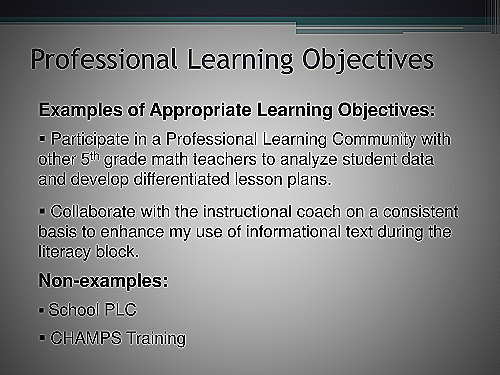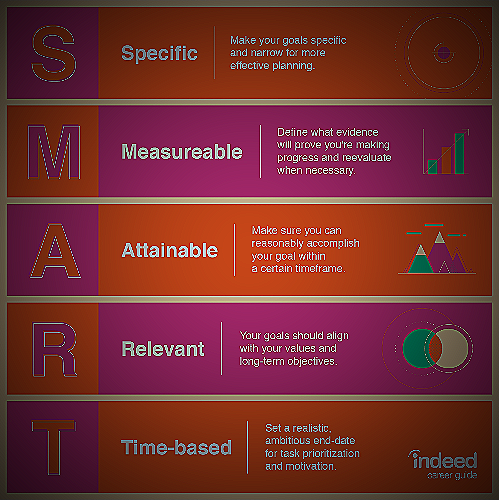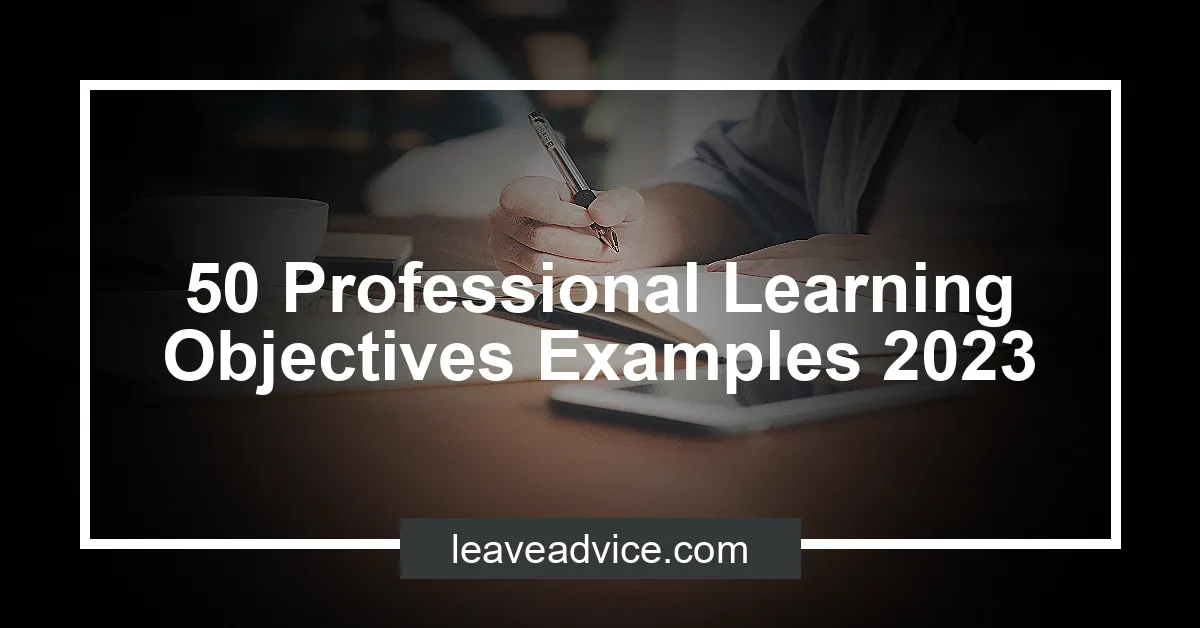50 Professional Learning Objectives Examples 2023
Professional learning objectives examples are essential for every individual’s career advancement. It enables individuals to have a defined direction, guides personal and professional growth, and improves their job performance.
With the rapidly changing job landscape, it is crucial to stay on top of your game and develop skills that meet the current and future demands of the industry. This article features some essential professional learning objectives examples that you can adapt to enhance your career growth and development.
According to a recent study, setting learning objectives enhances the effectiveness of professional growth and development. Having clear and measurable goals enhances motivation and leads to better job performance and overall job satisfaction.
It is, therefore, crucial to identify specific goals and take steps to achieve them. Professional learning objectives examples include enhancing leadership skills, communication skills, improving project management skills, learning a new language, taking up a new course, improving technology skills, and developing a personal brand, among others.
These objectives are essential for personal and professional growth and can help individuals achieve their career goals. To set smart goals for professional development, an individual should ensure that the objectives are Specific, Measurable, Achievable, Relevant, and Time-bound.
This framework helps to identify the objectives, track progress, and take actionable steps towards achieving the set goals. In conclusion, having professional learning objectives examples is essential for every working professional.
It provides a clear direction towards achieving career goals and enables individuals to stay on top of the changing job landscape. By setting smart goals for professional development, individuals can take actionable steps to improve their skills and enhance job performance, leading to overall job satisfaction.
Why Set Professional Learning Objectives?
Professional learning objectives are important to set for individuals looking to grow in their career. These objectives help to clarify their goals and provide a roadmap for their personal development.
By setting professional learning objectives, one can expect to have improved job performance, increased job satisfaction, and better career advancement opportunities.
Setting learning objectives is a critical step in promoting personal and professional growth. By doing so, individuals can identify areas where they need to improve and take steps to address those shortcomings.
This not only allows individuals to grow on the job but also benefits the organization as a whole.
For example, if a software developer is interested in learning a new coding language, setting a learning objective around acquiring proficiency in that language can not only benefit the developer’s career but also improve the organization’s software development capabilities.
In summary, setting professional learning objectives is important to ensure continued growth and success in a chosen career. It allows individuals to identify areas for improvement and provides a roadmap for personal development.
Examples of Professional Learning Objectives
Continuing Education and Skills Enhancement
Professional learning objectives examples related to continuing education and skills enhancement may include taking a class to improve Excel skills by September 2023, earning certification in project management by attending relevant courses within the next 12 months, and reading at least one current book or article from industry leaders per quarter to stay current with industry trends. These examples show the importance of setting specific and measurable objectives to continuously improve and develop skills in the workplace.
Ultimately, investing in continuing education can lead to increased job satisfaction, improved performance, and career advancement opportunities.
Leadership Development
Professional learning objectives examples for leadership development include developing mentoring relationships with at least two junior staffers by June 2023, identifying one leadership skill to improve such as presentation skills or conflict resolution, and taking steps to enhance that skill within the next six months. It is also recommended to attend a leadership seminar and implement at least three new leadership skills within the next year.
These objectives can help individuals grow and improve their leadership abilities, leading to greater success within their organization.
Personal Effectiveness
Professional learning objectives examples for personal effectiveness include increasing daily productivity through the consistent use of a time management app, enhancing technical writing skills through business writing courses, and requesting 360-degree feedback from senior colleagues and direct reports to increase self-awareness. These objectives aim to enhance an individual’s organizational skills, communication abilities, and self-awareness, which are crucial in managing oneself and achieving professional growth.
By setting and achieving these objectives, individuals can become more effective, efficient, and valuable in their roles.
Career Advancement
Professional learning objectives examples can greatly assist an individual in achieving their career advancement goals. Here are some examples:
- Create a clear career plan with clearly defined steps to reach the next level and submit it to your manager within the next month.
- Identify a potential new role within the company and develop a plan to achieve that role by the end of the next year.
- Build a strong personal brand by attending online training sessions and workshops from industry experts in the next quarter.
Taking the time to set clear objectives to improve your skills and knowledge can ensure that you meet your career goals. By leveraging the professional learning objectives examples above, individuals can begin to take actionable steps towards achieving their aspirations.
Attending online training and workshops, developing a clear career plan and identifying new roles can all assist in advancing a person’s career.
SMART Goals for Professional Learning Objectives
Specific
For professional learning objectives to be effective, they must be specific and relevant to an individual’s career or skill development. Specific objectives not only provide direction, but they also help measure progress and achievement.
Examples of specific learning objectives include “Develop proficiency in project management software” or “Master public speaking skills to present confidently at industry conferences.”
Another example of a specific learning objective is “Increase knowledge of effective leadership techniques to advance to a management position.” This objective not only relates to a specific career goal, but it also outlines the specific skill that the individual wants to develop, which is effective leadership.
The key to creating specific learning objectives is to focus on the skills or knowledge that the individual wants to develop and ensure that the objective is measurable and achievable.

Measurable
Measurable professional learning objectives examples include setting specific metrics or goals that can be measured and tracked. For example, a measurable objective could be to increase student engagement by 20% by the end of the semester.
Other examples could include improving teacher retention rates or increasing student achievement on standardized tests. By setting measurable objectives, educators can track their progress and make adjustments to their strategies as needed.
Attainable
When setting professional learning objectives, it’s important to ensure they are attainable within the given timeframe. For example, setting a goal to learn a new language in a week may not be realistic.
A more attainable learning objective could be to practice speaking and writing in the language for 30 minutes each day for a month. This allows for gradual progress and a higher likelihood of achieving the objective.
Some other examples of attainable learning objectives include:
- Completing a specific online course or module within a set time period
- Improving a specific skill, such as public speaking, by setting smaller goals and practicing regularly

Relevant
When setting professional learning objectives, it’s important to ensure that they are relevant to your job, career goals, and overall professional development. Setting objectives that align with your job expectations and responsibilities will not only make them easier to achieve, but it will also demonstrate your commitment to your role and your willingness to improve.
For example, if you’re a marketing professional, setting an objective to improve your social media skills or develop a deeper understanding of SEO would be relevant goals that would help you excel in your current position and prepare you for future career growth.
Additionally, it’s important to ensure that your objectives are relevant to your broader career goals and aspirations. For example, if you aspire to a leadership role in your organization, setting objectives that focus on improving your communication, team management, or strategic planning skills would be relevant and beneficial to achieving your career goals.
Overall, setting relevant professional learning objectives requires careful consideration of both your current job responsibilities and your long-term career goals. By aligning your objectives with these factors, you can ensure that you are focusing your time and efforts on areas that will have the greatest impact on your professional success.
Time-bound
A professional learning objective example that is time-bound is to complete a course in advanced Excel within 6 months.
Another example is to improve presentation skills in 3 months by attending weekly workshops and delivering presentations to colleagues. Setting a specific deadline and timeline can help individuals stay focused and motivated towards achieving their learning objectives.
It is important to establish a timeframe that is reasonable and achievable while also pushing oneself out of their comfort zone. By setting a realistic but challenging deadline, individuals can continuously improve and grow in their professional development.
Conclusion
Professional learning objectives provide a clear direction for career goals and advancement. To create effective objectives, it is advisable to follow the SMART guidelines to create goals that are Specific, Measurable, Attainable, Relevant, and Time-bound.
Use the examples shared in this article to develop learning objectives that align with your career goals, and ensure that your areas of development are addressed appropriately. This will ensure a fulfilling career and job satisfaction in the long run.
References
- 9 Examples of Professional Development Goals to Achieve Success
- 50 Professional Development Objectives Examples for Your Resume and Job
- 16 Professional Development Goals to Consider for Your Career

